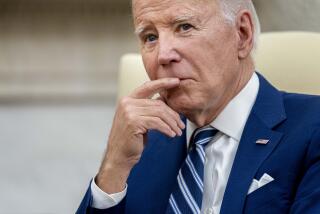War of Words Reopens Democratic Party Rift
- Share via
WASHINGTON — The pointed words last weekend between former running mates Al Gore and Sen. Joseph I. Lieberman (D-Conn.) over the Democratic message in 2000 have reopened a long-standing split in the party, but the dispute may only serve to divert attention from the key challenges facing the Democrats in the next elections for Congress and the White House.
While the two men are arguing over whether Gore’s “people versus the powerful” populism is the right economic message for the party, much evidence indicates that cultural attitudes had a larger effect on the 2000 election--and could present a more formidable hurdle for Democrats in 2002 as well.
Indeed, exit polling from the 2000 campaign suggests that Gore’s populist appeal neither attracted the working-class voters it targeted nor repelled the more affluent voters that critics believe it alienated. More dramatic was the party’s decline in 2000 among culturally conservative rural voters, who will likely prove a decisive group again in many of the most competitive Senate and House races this fall. “The populism in the message, at the end of the day, did not make much difference one way or the other,” says Democratic pollster Mark Mellman.
Yet the new argument over Gore’s old message may solidify his position, even as he is showing increasing strength among Democratic voters looking toward the 2004 nomination. The exchange allowed Gore--through an op-ed piece in Sunday’s New York Times--to remind Americans that he had offered himself as a fighter against the “forces of greed” long before Enron, WorldCom and other corporate scandals encouraged politicians in both parties to trumpet more populist notes.
“Frankly, Lieberman succeeded in elevating Gore in a way that hasn’t been done recently,” said a top advisor to another Democrat exploring the 2004 race. “He gave him a chance to defend a message that does well with our base, and I can’t for the life of me understand what Lieberman’s strategy was in doing that.”
Gore has said that he will decide by year’s end whether to seek the Democratic nomination in 2004. Lieberman has said that he will not run if Gore does, but he also has strongly suggested that he will if the former vice president doesn’t.
The fireworks between Gore and Lieberman--which both sides insist does not signal any personal rift--reignited an internal Democratic debate, which first flared immediately after the 2000 election, over whether Gore had drifted too far left against George W. Bush.
The argument touched on issues such as whether Gore had overemphasized new spending programs in his campaign. But at its core was a dispute over Gore’s heavy reliance on populist themes--particularly that he would represent “the people” against “the powerful.”
Even before the Supreme Court declared Bush the winner, the Democratic Leadership Council--a centrist party group that had been closely allied with Gore before the campaign--issued a study charging that Gore’s confrontational populism had alienated upwardly mobile suburban voters, whom President Clinton had attracted to the party in 1996. Soon thereafter, Stanley B. Greenberg, Gore’s pollster in the general election, released a competing study, which concluded that Gore’s populist message “helped him create a potential majority” in the election.
Lieberman reopened the argument last week at a DLC meeting in New York City. Meeting with reporters, Lieberman said Gore’s pugnacious rhetoric had alienated middle-class voters “who don’t see America as us versus them.”
Lieberman had made similar, if somewhat less pointed, comments earlier, and he had privately expressed reservations about the message even during the campaign, former Gore advisors acknowledge. (“He is saying in public what he said in private,” said one former campaign official.) In an appearance on “Fox News Sunday,” Lieberman emphasized that his complaint was with Gore’s 2000 rhetoric, not his agenda or record: “Al’s whole record is consistent with ‘New Democratic’ values, which is growth and fiscal responsibility,” Lieberman said.
But Gore rocketed the controversy to a new level the same day with a lengthy op-ed piece in the New York Times. In his commentary, Gore aimed at opponents in both parties, arguing that events had not only borne out his campaign criticisms of Bush on issues such as the deficit and prescription drugs, but had also validated his populist tone. “The suggestion from some in our party that we should no longer speak the truth, especially at a time like this, strikes me as bad politics and wrong in principle,” Gore wrote.
Gore aides said the piece was not written as a response to Lieberman, but they acknowledged that Gore was aware of the senator’s thoughts and that they were “one of the factors” that led him to write the article. In fact, for all the heat in this argument, the evidence from the 2000 exit polls suggests that Gore’s populism didn’t have as much of an effect as either its supporters or its opponents believed.
Gore’s populism was aimed largely at working-class voters, but he didn’t run as well with those voters in 2000 as Clinton did in 1996, when he entirely avoided populist themes. Meanwhile, Gore ran better than Clinton among voters earning $100,000 a year or more--some of the affluent voters who critics thought were alienated by the populism.
Other findings in the polls suggested that cultural attitudes--on issues such as guns, abortion and Clinton’s affair with Monica S. Lewinsky--influenced voters in 2000 more than the economic issues at the core of Gore’s populism. Compared with Clinton in 1996, Gore lost far more ground among rural voters than the suburbanites the DLC feared he was driving away with his populism.
And some Democratic strategists believe that culturally reconnecting with those small-town voters may be a more urgent priority for the party in 2002 than calibrating the right level of economic populism. An unusual concentration of the most competitive Senate races this year are in Midwestern and Southern states with large rural populations, such as South Dakota and Arkansas. “A lot of the task before us is to take fairly conservative men whose economic interests lie with the Democratic Party and put them at ease culturally,” said Jim Jordan, executive director of the Democratic Senatorial Campaign Committee.
For Gore, the exchange continues a process of reemergence that began with a fiery speech in April to a state Democratic convention in Florida. As his visibility has increased, so has his showing in early tests of Democratic sentiment for 2004; a survey released Monday by independent pollster John Zogby found that 47% of Democrats believe Gore “deserves” the presidential nomination--up from 38% in March.
Beyond Gore’s heightened visibility, some analysts believe that the economic slowdown and Wall Street scandals have made the former vice president’s populist message more relevant now than during the boom times of 2000. “I think circumstances have caught up to the message that he talked about in the campaign,” says Tad Devine, a senior advisor in 2000.
More to Read
Get the L.A. Times Politics newsletter
Deeply reported insights into legislation, politics and policy from Sacramento, Washington and beyond. In your inbox twice per week.
You may occasionally receive promotional content from the Los Angeles Times.










